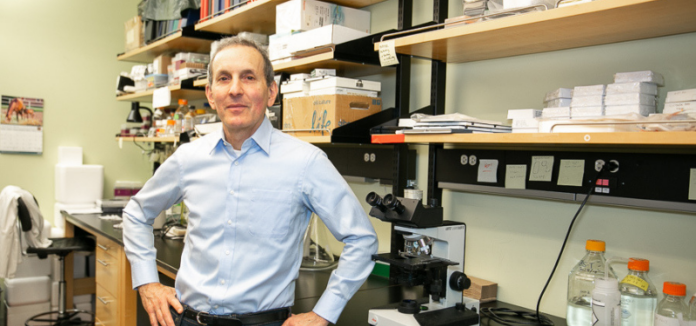In the world of medical research, some breakthroughs are so profound that they change the course of treatment for millions of people.
One such breakthrough in 2023 has taken the spotlight, thanks to the pioneering work of Dr. Daniel Drucker. His ground-breaking research on glucagon-like peptide 1 (GLP-1)-based diabetes drugs has not only transformed the lives of people with type 2 diabetes, but has also earned him the coveted title of 2023 breakthrough of the year by Science Magazine.
Millions of people have benefited from GLP-1 agonists, a class of drugs that go beyond just weight loss. These medications have long been known to improve metabolic health, but how they achieve this remained a mystery — until Drucker and his team set out to unravel it.
The Gut-Brain-Immune Network
Drucker’s research, conducted at the Lunenfeld-Tanenbaum Research Institute (LTRI), part of Sinai Health, has uncovered a remarkable connection between the gut, the brain, and the immune system. They have identified a gut-brain-immune network that plays a critical role in controlling inflammation throughout the body, impacting the health of our organs.
GLP-1 receptor agonists, such as Ozempic/Wegovy and Mounjaro/Zepbound, mimic a gut hormone called GLP-1, which regulates blood sugar levels and appetite. While these drugs have been used for over 18 years to treat type 2 diabetes, they have also been found to reduce the complications of chronic metabolic diseases, including heart disease, fatty liver disease, and kidney disease.
Drucker, who holds the BBDC-Novo Nordisk Chair in Incretin Biology and is a Professor of Medicine at the University of Toronto, has been at the forefront of this research. He explains in a Sinai press release, “One of the really interesting things about the GLP-1 drugs is that beyond the control of blood sugar and body weight, they also seem to reduce the complications of chronic metabolic disease.”
The Brain’s Role
So, how do these drugs achieve these remarkable effects? Drucker had a hunch that the brain might play a crucial role in this process. His intuition was based on two key factors: the abundance of GLP-1 receptors in the brain and the well-established communication between the brain and the immune system, which affects all organs in the body.
In their research, Drucker’s team induced systemic inflammation in mice, a process that mirrors chronic metabolic diseases in humans. Remarkably, GLP-1 agonists reduced inflammation — but only when its receptors in the brain were unblocked. When these brain receptors were inhibited or removed in mice, the drugs’ ability to reduce inflammation was lost.
This discovery has far-reaching implications. It shows, for the first time, that there exists a GLP-1-brain-immune axis that controls inflammation across the body, independently of weight loss. Even in organs where GLP-1 receptors are scarce, such as the heart, liver, and kidneys, this brain-immune axis plays a vital role.
Drucker elaborates, “The strange thing is that you can’t find many GLP-1 receptors in all these other organs where GLP-1 seems to work.” This observation led to the realization that the brain, abundant in GLP-1 receptors, plays a crucial role in mediating the drug’s effects.
Dr. Drucker’s Impact
Drucker’s contributions to the field of diabetes research are nothing short of remarkable. His early work on the GLP-1 hormone provided crucial insights into its molecular mechanisms, paving the way for the development of drugs like Ozempic and others. His dedication and ground-breaking discoveries have earned him some of the most prestigious awards in the life sciences, including the 2021 Canada Gairdner International Award and the 2023 Wolf Prize in Medicine. In our conversation with Drucker in 2022 he said, “Understanding opportunities to help people through science is tremendously appealing and that’s exactly how the story has turned out.” Drucker also recently was awarded the 2023 VinFuture Special Prize in recognition of his breakthrough work in scientific and technological innovations.
Dr. Anne-Claude Gingras, Director of the LTRI and Vice-President of Research at Sinai Health, emphasizes the significance of this work, saying, “As the scientific community deservingly celebrates GLP-1 agonists and their impact, there are many unknowns left. Dr. Drucker and his team have remained tenacious in their efforts to unpack how these drugs work, and this study deepens our understanding of metabolism and the complex brain-immune network that regulates it.”
The Future of Diabetes Treatment
While Drucker’s research has shed light on the mechanisms behind the success of GLP-1 drugs, the work is far from complete. His team is now focused on pinpointing the specific brain cells that interact with GLP-1. They are also examining various mouse models of inflammation, including heart disease, atherosclerosis, and liver and kidney inflammation, to determine whether the beneficial effects of GLP-1 in each case are indeed mediated through the brain.
Understanding how GLP-1 dampens inflammation opens new avenues for reducing the complications associated with type 2 diabetes and obesity. This breakthrough has the potential to revolutionize the treatment of chronic metabolic diseases and improve the lives of millions worldwide.
Drucker’s ground-breaking research in the field of GLP-1-based diabetes drugs has not only transformed our understanding of metabolic diseases, but also offers hope for more effective treatments in the future. His work highlights the expanding clinical impact of GLP-1, and underscores the immense potential of basic scientific discovery to continuously enhance human health.
“For all their promise, GLP-1 agonists have raised more questions than they have answered — a hallmark of a true breakthrough,” notes Holden Thorp, editor-in-chief of Science journals.
As we celebrate this remarkable achievement, we eagerly anticipate the future advancements that will stem from Drucker’s relentless pursuit of knowledge in the quest to combat diabetes and related health challenges.








































